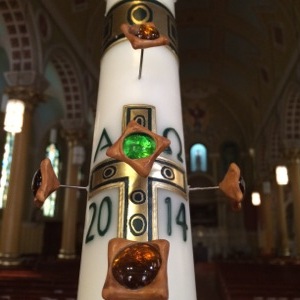February 14, 2016
In her biography, The Long Loneliness, Dorothy Day shares how, shortly after her conversion to
Catholicism, she went through a painful, desert time.
She had just given birth to her daughter and her decision to
have the child baptized, coupled with her profession of faith, meant the end of
her relationship with a man she deeply loved. S
he suddenly found herself alone.
All her old supports had been cut off and she was left with
no money, no job, few friends, no practical dream, and no companionship from
the person she loved the most deeply in this world.
For a while she just stumbled on, trusting that things would
soon get better.
They didn’t. She remained in this desert.
One day, not knowing what else to do, she took a train from
New York to Washington to spend a day praying at the National Shrine of Our
Lady.
Her prayer there was wrenching, naked.
She describes how she laid bare her helplessness, spilling
out her confusion, her doubts, her fears, and her temptations to bitterness and
despair.
In essence, she said to God: “I have given up everything
that ever supported me, in trust, to you.
I have nothing left to hold on to.
You need to do something for me, soon.
I can’t keep this up much longer!”
She was, biblically speaking, in the desert—alone, without
support, helpless before a chaos that threatened to overwhelm her—and, as was
the case with Jesus, both in the desert and in Gethsemane, God “sent angels to
minister to her.”
God steadied her in the chaos.
She caught a train back to New York and, that very night, as
walked up to her apartment she saw a man sitting there.
His name was Peter Maurin and the rest is history.
Together they started the Catholic Worker.
We should not be surprised that her prayer had such a
tangible result.
The desert, scripture assures us, is the place where God is
specially near.
Martin Luther King shares a similar story. In Stride Towards Freedom he relates how one night a hate-filled phone call
shook him to his depths and plunged him into a desert of fear. Here are his
words:
An angry voice said: “Listen, nigger, we’ve taken all we
want from you; before next week you’ll be sorry you ever came to Montgomery.”
I hung up, but I couldn’t sleep.
It seemed that all of my fears had come down on me at once.
I had reached the saturation point.
I got out of bed and began to walk the floor.
Finally I went to the kitchen and heated a pot of coffee.
I was ready to give up.
With my coffee sitting untouched before me I tried to think
of a way to move out of the picture without appearing a coward.
In this state of exhaustion, when my courage had all but
gone, I decided to take my problem to God.
With my head in my hand, I bowed over the kitchen table and
prayed aloud.
The words I spoke to God that midnight are still vivid in my
memory.
I am here taking a stand for what I believe is right.
But now I am afraid.
The people are looking to me for leadership and if I stand
before them without strength and courage, they too will falter.
I am at the end of my powers.
I have nothing left.
I’ve come to the point where I can’t take it alone.”
At that moment I experienced the presence of the Divine as I
had never experienced Him before.
God sends his angels to minister to us when we are in the
desert and in the garden of Gethsemane.
This incident in Martin Luther King’s life demonstrates how.
The desert, as we know, is the place where, stripped of all
that normally nourishes and supports us, we are exposed to chaos, raw fear, and
demons of every kind.
In the desert we are exposed, body and soul, made vulnerable
to be overwhelmed by chaos and temptations of every kind.
But, precisely because we are so stripped of everything we
normally rely on, this is also a privileged moment for grace.
Why? Because all the defense mechanisms, support systems,
and distractions that we normally surround ourselves with so as to keep chaos
and fear at bay work at the same time to keep much of God’s grace at bay.
What we use, to buoy us up, wards off both chaos and grace,
demons and the divine alike.
Conversely, when we are helpless we are open.
That is why the desert is both the place of chaos and the
place of God’s closeness.
It is no accident that Dorothy Day and Martin Luther King
felt God’s presence so unmistakably just at that point in their lives where
they had lost everything that could support them.
They were in the desert.
Scripture assures us that it is there that God can send
angels to minister to usClick here for scripture readings







 Is the abundant service of women insufficiently acknowledged in the church?
Is the abundant service of women insufficiently acknowledged in the church?

